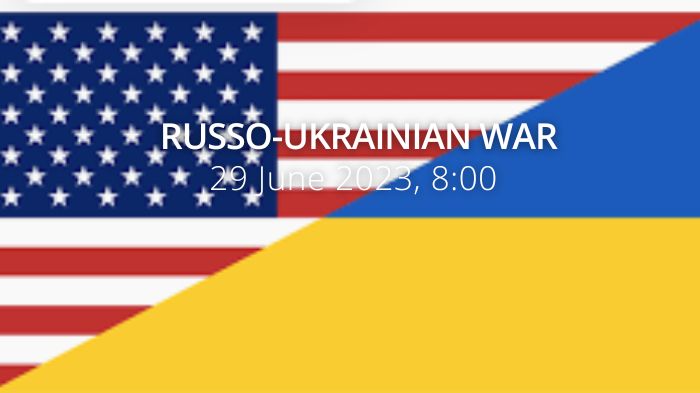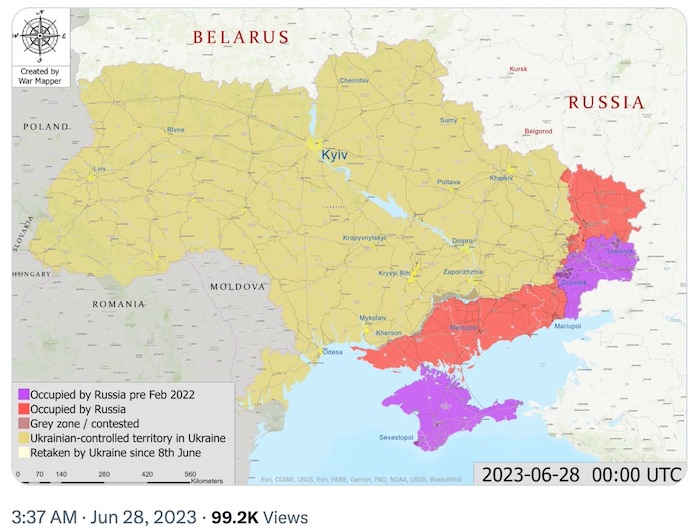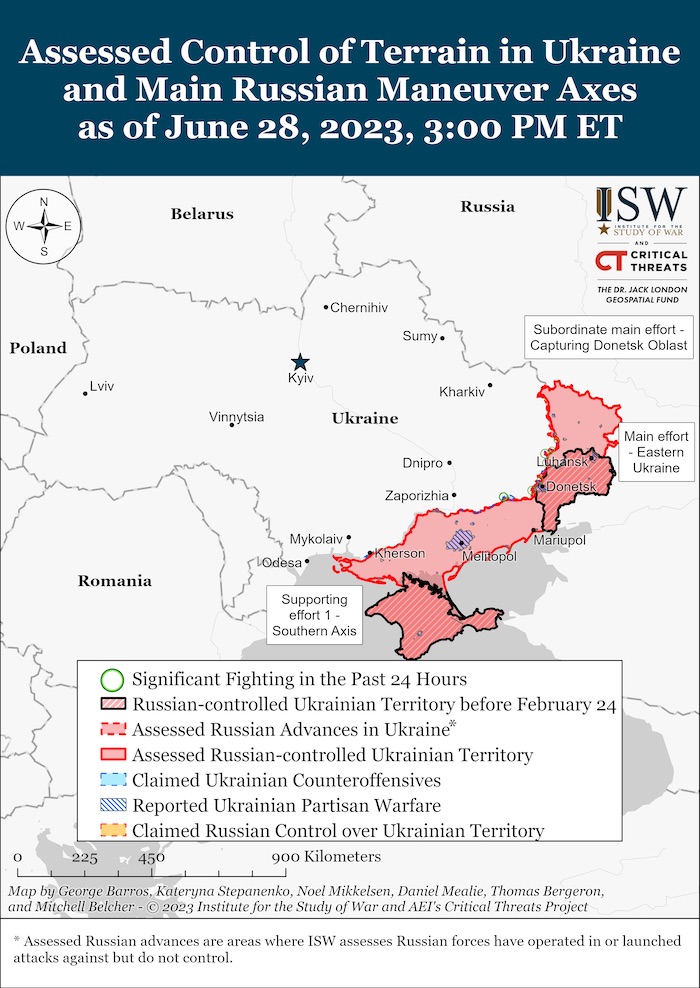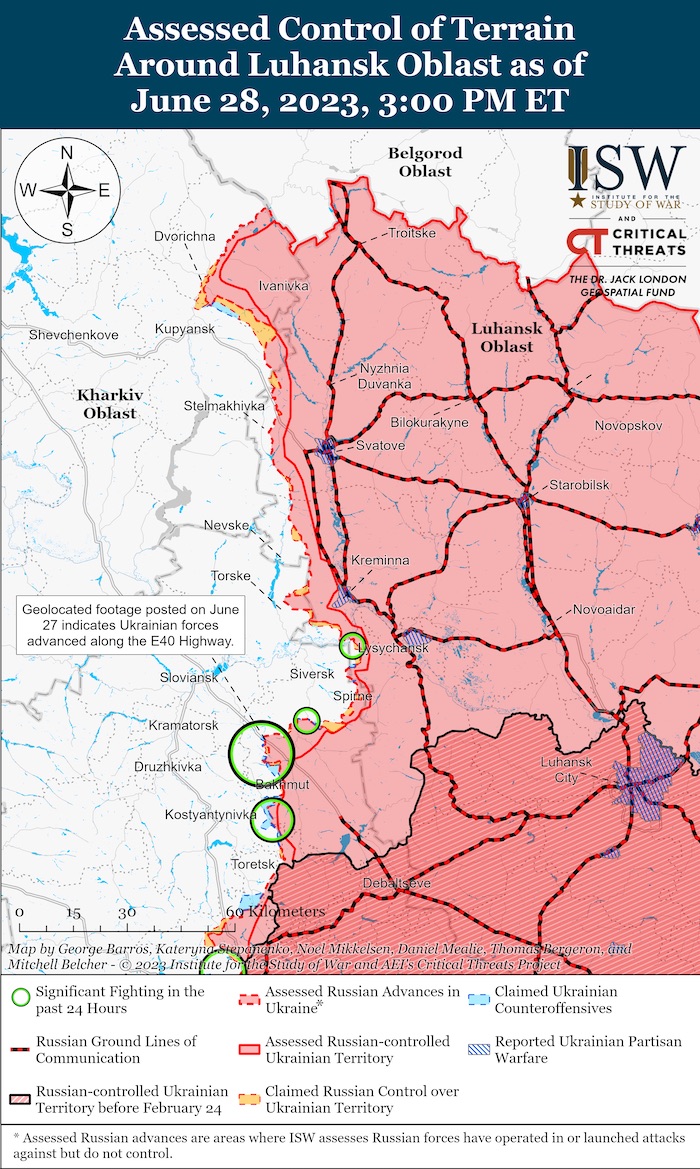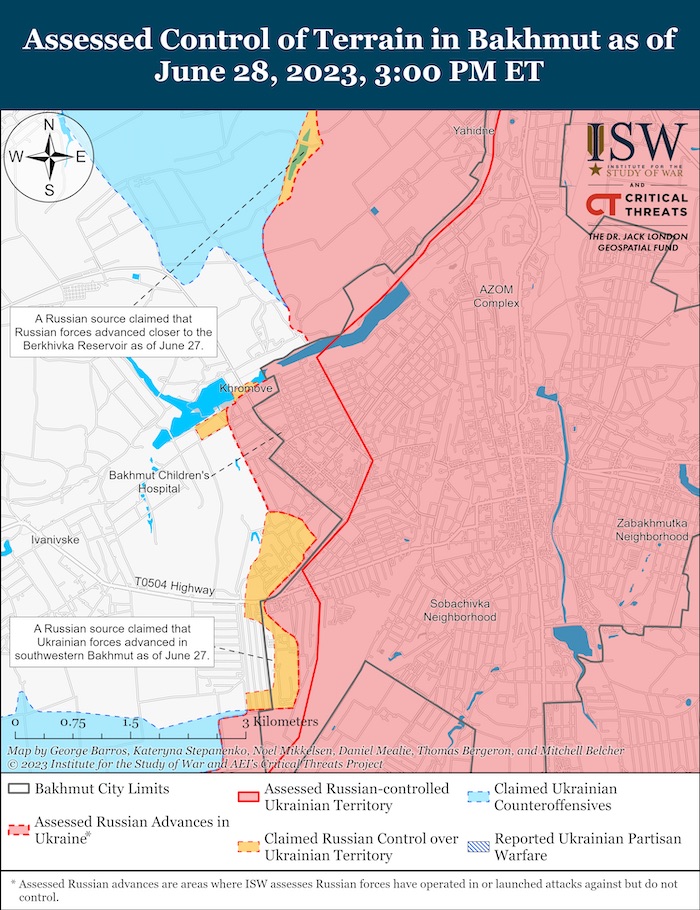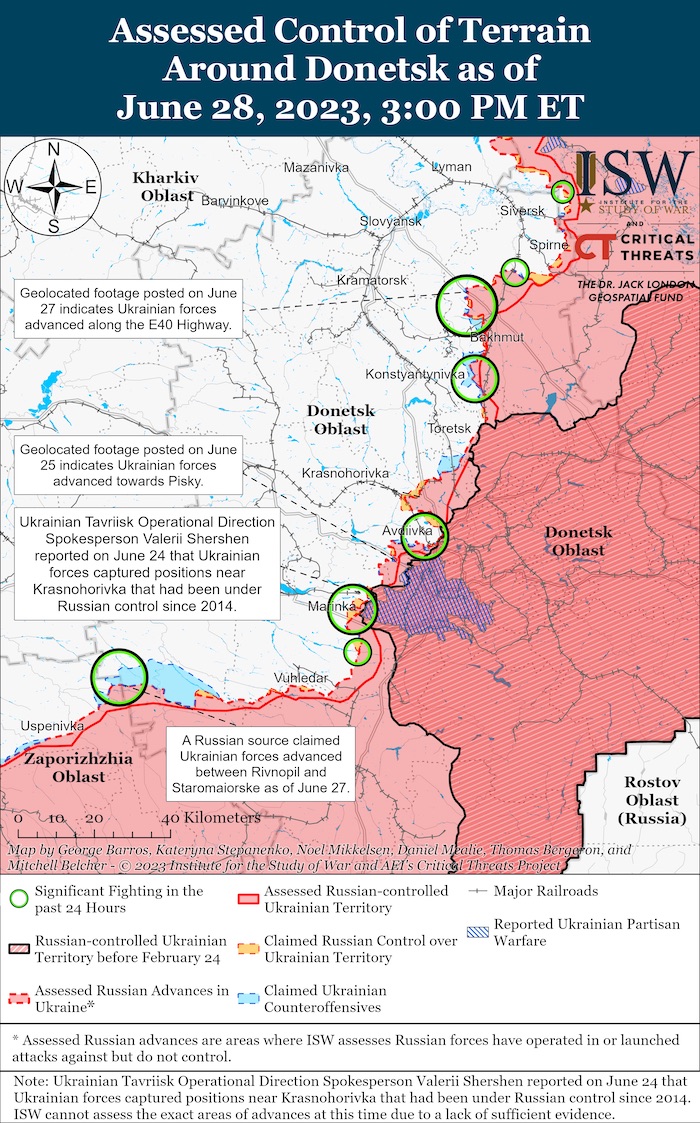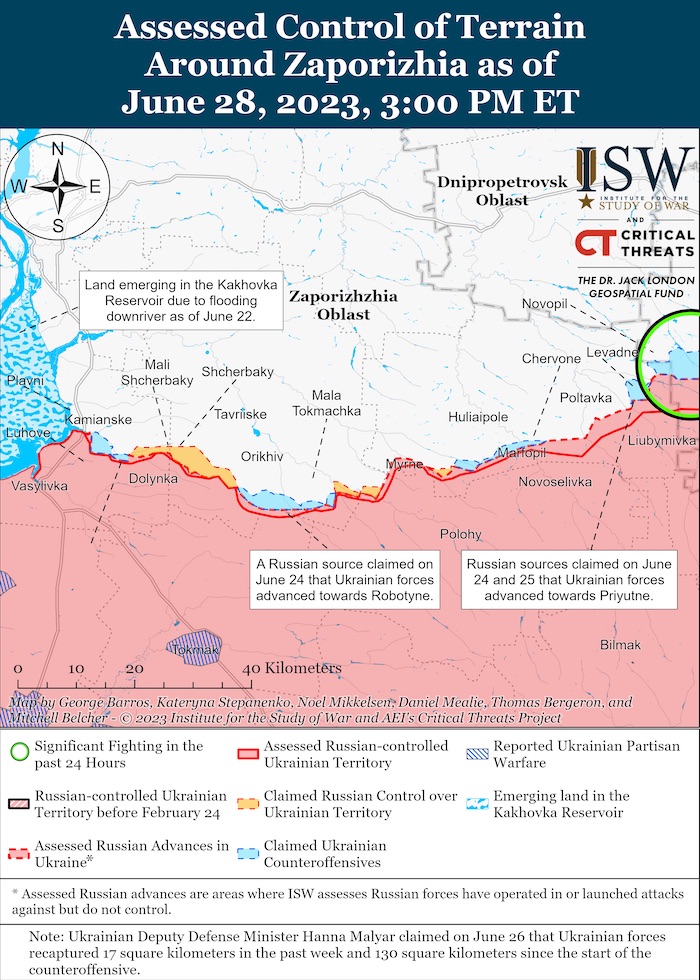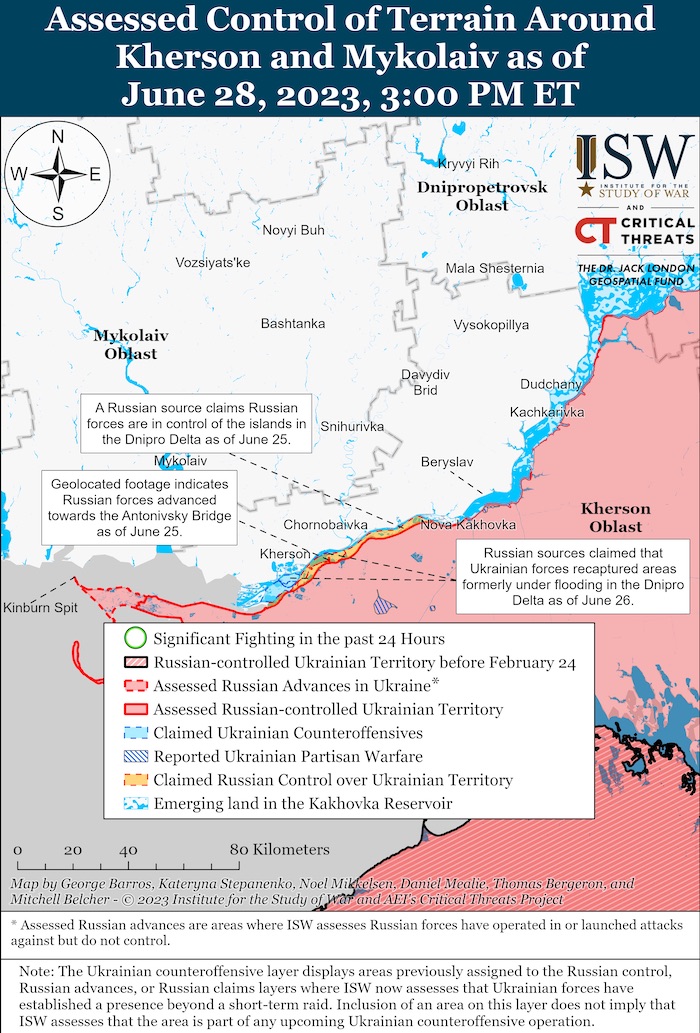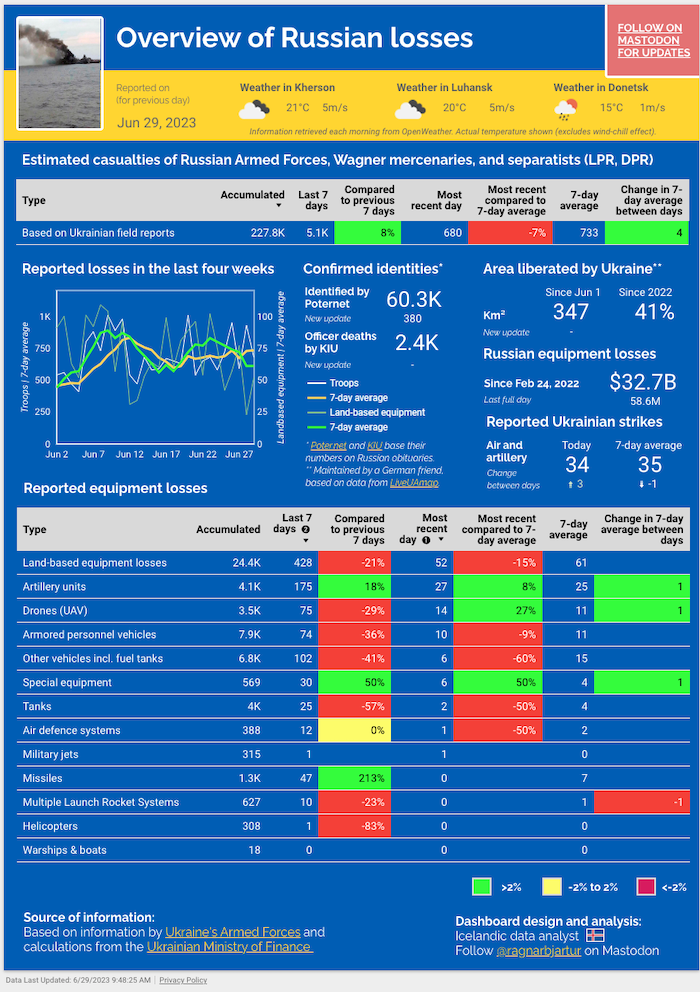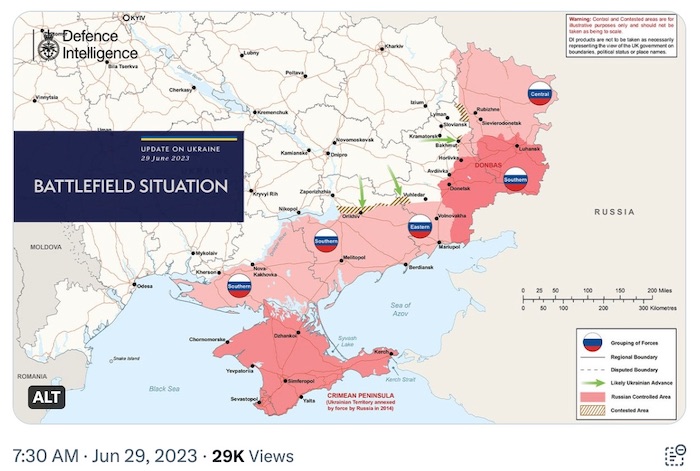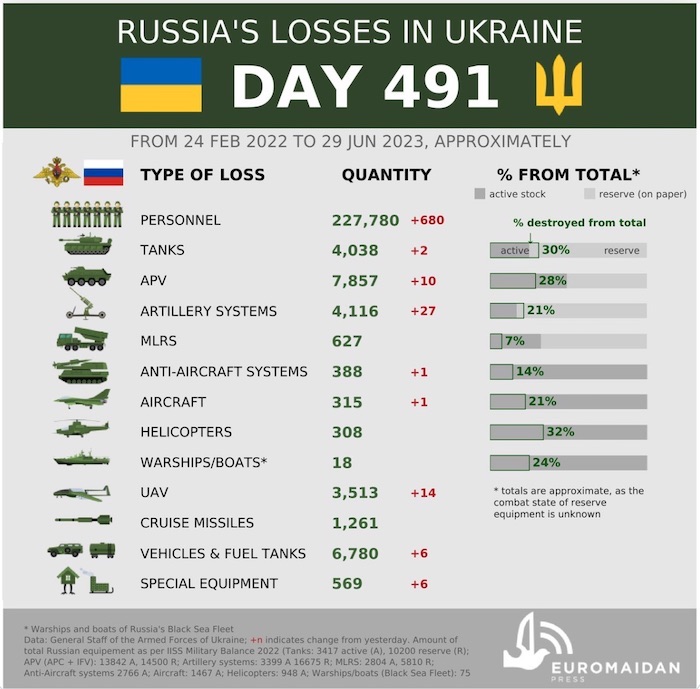Continued reporting about the deal mediated by Belarusian dictator Alexander Lukashenko to end the Wagner Group’s armed rebellion suggests that involved parties may still be negotiating the specifics of the agreement. Independent Belarusian monitoring group The Hajun Project cited flight tracking data on June 27 suggesting that Wagner Group financier Yevgeny Prigozhin’s jet took off from the Machulishchy airfield in Belarus towards Russia, flew to Moscow, and then immediately took off for St. Petersburg.[1] Former Russian officer and prominent critical milblogger Igor Girkin claimed that Prigozhin returned to Russia to negotiate with unspecified Russian officials and the Wagner Commander’s Council.[2] ISW cannot independently confirm if Prigozhin did in fact return to Russia, nor the details of the purported visit, but Prigozhin may have returned briefly to work out further details of the deal negotiated by Belarusian dictator Alexander Lukashenko.
Russian sources continued to speculate on the specifics of this deal on June 28. A Wagner-affiliated Russian milblogger posted an interview with a Belarusian Wagner fighter wherein the fighter claimed that Wagner has opened a “new combat direction” in Belarus and that some Wagner fighters will “work in Russia” while some “work in Belarus.”[3] Russian opposition outlet Meduza, citing a source within the Russian Ministry of Defense (MoD) claimed that only 1,000 Wagner fighters went to Belarus with Prigozhin, however.[4] Belarusian opposition channel Belamova additionally claimed that satellite imagery from June 27 shows the construction of a new military object in the Osipovichi raion that was not visible as of June 13, suggesting that the imagery could show the construction of a Wagner training camp in Belarus.[5] It is unclear if construction of the military object appeared before the announcement of the Prigozhin-Lukashenko deal on June 24, and ISW cannot independently confirm if the object is in any way related to Wagner.[6] However, the pervasive speculation surrounding Wagner’s position in Belarus suggests that certain aspects of the deal are still being worked out.
Russian sources speculated that Wagner’s rebellion is already having widespread impacts on the Russian command structure. A prominent Russian milblogger claimed that Wagner’s rebellion has prompted “large-scale purges” among the command cadre of the Russian armed forces and that the Russian MoD is currently undergoing a “crash test” for loyalty.[7] The milblogger claimed that the Russian Federal Protective Service (FSO) is conducting a review of the Russian military leadership as well as the individual unit commanders.[8] The milblogger claimed that Russian officials are using the MoD’s “indecisiveness” in suppressing the rebellion and “support for paramilitary companies (PMCs)” as pretexts to remove “objectionable” personnel from their positions. The milblogger notably claimed that Russian Airborne Forces (VDV) commander and rumored deputy theater commander Colonel General Mikhail Teplinsky assumed responsibilities as overall theater commander in Ukraine from Chief of the General Staff and current overall theater commander Army General Valery Gerasimov on an unspecified date, but likely after the rebellion. The milblogger emphasized that Gerasimov will retain his post as Chief of the General Staff but will no longer have responsibilities for Russian operations in Ukraine. Another Russian source claimed that an “atmosphere of suspicion has enveloped the General Staff” and that affiliates of Gerasimov are accused of indecision and failure while the affiliates of deputy commander of the joint grouping of forces in Ukraine Army General Sergei Surovikin are accused of complicity in the rebellion.[9] The sources publishing these speculations have largely been accurate in previous reporting on Russian command changes, although the ongoing disruption to human networks and the severe potential consequences related to Prigozhin’s armed rebellion may affect these sources’ accuracy. ISW cannot confirm any of these speculations about the command changes at this time, but it is evident that the armed rebellion is continuing to have substantial ramifications in the information space.
Russian authorities reportedly arrested Army General Sergei Surovikin on June 28, possibly indicating that the Kremlin intends to purge the MoD of figures viewed as disloyal. Russian opposition source The Moscow Times reported on June 28 that two sources close to the MoD confirmed that the Russian authorities had arrested Surovikin because he chose to side with Prigozhin during the rebellion.[10] The New York Times reported on June 28 that US officials briefed on US intelligence stated that Surovikin had advance knowledge of the rebellion, but that US intelligence is still trying to ascertain if Surovikin directly supported Prigozhin’s effort.[11] It is unclear what transpired that would have forced Surovikin to call on Prigozhin to end the rebellion only several hours after its start, although it is possible that he did so under duress instead of out of support for the Russian military leadership. If Russian authorities did arrest Surovikin then the Kremlin will likely use Surovikin and his affiliates as scapegoats to publicly explain why the Russian military and Russian internal security apparatuses responded poorly to the rebellion and to justify a potential overhaul of the Russian military leadership. ISW has previously reported on Surovikin‘s notable Wagner affiliations and alleged support for Wagner, and Surovikin is a prime candidate for a scapegoat regardless of the actual level of support he gave to the rebellion.[12]
The Kremlin will likely attempt to balance a desire to mitigate the widespread disdain for MoD establishment figures that fueled Wagner’s rebellion while also trying to disempower those who may have sympathized with the rebellion. Segments of the pro-war ultranationalist community and the Russian military have routinely criticized Gerasimov and Russian Defense Minister Sergei Shoigu for their management of the war in Ukraine, and Prigozhin’s avowed goal of forcibly removing the two generals suggests that the Kremlin may view Gerasimov’s and Shoigu’s unpopularity as a direct threat to Putin’s ability to retain support among key constituencies and the military.[13] ISW previously assessed that the Kremlin is likely attempting to signal that Shoigu will maintain his position, but the Kremlin has yet to promote Gerasimov in a similar way in the days following the rebellion.[14] The Kremlin may attempt to placate disdain for the MoD establishment by reducing Gerasimov’s role in operations in Ukraine, although he is highly likely to maintain, at least nominally, the position of overall theater commander and his long-term role as Chief of the General Staff. ISW has previously assessed that Gerasimov’s removal from either position would be too damaging to Putin’s and the MoD’s reputation. Putin could attempt to avoid the fallout from future command changes by increasingly rewarding commanders with responsibility beyond their official positions.[15] Putin is likely further incentivized not to publicly replace Gerasimov out of fears of legitimizing rebellion as a successful means of blackmail. The speculations that Gerasimov’s role is diminishing in Ukraine may suggest that Putin is diverting Gerasimov to another effort instead of completely demoting him. Putin likely values Gerasimov for his loyalty above all else, and he may task Gerasimov with staff changes within the MoD focused on loyalty should the Kremlin decide to overhaul the Russian military leadership.[16]
The Kremlin may have chosen Teplinsky as a de facto overall theater commander because he is reportedly widely popular among the Russian rank-and-file and the Russian ultranationalist community.[17] Teplinsky previously commanded forces alongside Wagner around Bakhmut in the winter of 2023, but it is not immediately clear if Teplinsky supported Wagner more generally as Surovikin reportedly did, and Teplinsky remained silent during the armed rebellion.[18] Teplinsky reportedly expressed dissatisfaction with the current military command directly to Putin in late February and assumed a leading military command position in April 2023, becoming one of the most notable anti-Gerasimov commanders aside from Surovikin.[19] Teplinsky is allegedly in charge of sectors of the front where Russian forces are currently defending against Ukrainian counteroffensive operations, and speculations of his de facto appointment to overall theater commander may indicate that the Kremlin sought to reward Teplinsky for overseeing doctrinal Russian defensive operations in these areas of the front or to find a public face for the war effort who can claim credit for showing at least basic military competence to offset or distract from the attention Prigozhin had received for the seizure of Bakhmut.[20] The Kremlin may choose to assign responsibilities for command in Ukraine in such a way that Russian military officials privately recognize that an anti-Gerasimov figure controls the war effort in Ukraine without the Kremlin having to acknowledge that fact publicly. The Kremlin will likely struggle to balance between appeasing discontent with the MoD and purging it of disloyal figures without contradicting its rhetoric and actions. Should it find that balance too hard to strike it may choose to pursue only one of the goals. In that event, the Kremlin will almost certainly choose the effort of purging disloyal figures regardless of continued ire towards the MoD leadership.
Russian sources claimed that the Kremlin is punishing Russian forces that it perceives to have failed in their response to the rebellion. Russian milbloggers claimed that Russian pilots who refused to strike the Wagner convoys and Russian border guards who refused to open fire on Wagner are now facing unspecified criminal prosecution.[21] The Kremlin may punish lower-ranking Russian servicemen to create additional scapegoats for their response to the rebellion, although refusal to obey legal and direct orders would be grounds for courts martial in any military, and an order to fire on forces engaged in armed rebellion would very likely be legal. ISW cannot confirm these milblogger claims at this time.
The Russian Duma is considering additional measures to increase control over the information space and promote self-censorship within broad internet communities. First Deputy Chairperson for the State Duma Education Committee Yana Lantratova stated on June 27 that the State Duma will propose to appoint a body “authorized to monitor the activities of bloggers.”[22] Lantratova also stated that Duma deputies will submit an additional bill on the registration of bloggers as “mass media” and that defines the rights and obligations of bloggers.[23] While reporting on this bill does not specify military correspondents or milbloggers, it is likely that milbloggers will fall into the broad category of “bloggers” and will be subject to increased regulation and control by the proposed monitoring body and resultant bill. ISW has previously reported on the efforts of Russian authorities to increase censorship of milbloggers and military commentators.[24] The Duma may have suggested this law using the broad category of “blogger” to avoid drawing specific ire from milbloggers, who largely did not comment on these updates on July 28.
Belarus formally ratified an agreement on the establishment of joint Russian-Belarusian training centers in Belarus on June 28. Belarusian media reported that Belarusian deputies adopted a draft law on the ratification of an agreement between Russia and Belarus on the “establishment and operation of combat training centers for joint training of military personnel” of Belarusian and Russian military personnel.[25] Belarusian Defense Minister Viktor Khrenin noted that the main tasks of these combat training centers is the “unification of combat training” by Russian and Belarusian forces.[26] ISW previously assessed in April of 2021 that Russia opened such training centers in Belarus to set conditions for further permanent military basing as part of the wider Russian effort to entirely subordinate Belarus under Kremlin control.[27] The agreement on joint training centers was previously signed on March 28, 2023, on the basis of an October 31, 2022, draft treaty law.[28] The ratification of the pre-existing agreement is the next step in the Kremlin’s ongoing campaign to secure the military subordination of Belarus and is not related to the reported deal between Wagner Group financier Yevgeny Prigozhin and Belarusian dictator Alexander Lukashenko on Wagner’s exile to Belarus following the June 23-24 armed rebellion.
Russian Defense Minister Sergei Shoigu held a phone conversation with the Chief of the General Staff of the Armed Forces of the Islamic Republic of Iran Major General Mohammad Bagheri on June 28. Russian media reported that Shoigu and Bagheri discussed issues of bilateral military and military-technical cooperation, regional security, and the wider international situation and announced their intention to deepen bilateral dialogue and develop additional defense contracts.[29] Bagheri is responsible for Iranian military policy and strategic guidance and previously met with Shoigu in Moscow in October 2021.[30] Bagheri’s senior role within Iran’s security apparatus suggests that he could be discussing arms sales with Shoigu. Iranian officials have previously expressed interest in receiving Russian fighter jets and air defense systems in return for Iran’s support for the Russian war effort, though these sales have not yet materialized.[31] ISW and the Critical Threats Project had previously assessed that Iran is seeking to leverage arms sales to generate revenue for the Iranian economy.[32]
Unconfirmed reports claim that Russian military police allegedly detained Wagner Group commanders in Syria. Saudi Arabian TV channel Al Hadath reportedly stated on June 27 on air that Russian military police detained the head of Wagner’s branch in Suwayda, Syria, and three other “high-ranking” Wagner commanders at the Hmeimim Air Base and visited Wagner offices in Damascus, Hama, and Deir ez Zor.[33] Russian news outlet Kommersant reported that Wagner commander Dmitry Utkin later denied these claims of Wagner personnel arrests in Syria on his Telegram channel.[34] Another Wagner-affiliated Telegram channel also denied the arrests.[35] ISW is unable to independently verify these claims at this time.
Ukrainian forces conducted counteroffensive operations in at least four sectors of the front. The Ukrainian General Staff reported that Ukrainian forces are conducting offensive operations in the Bakhmut direction, along the western Donetsk-eastern Zaporizhzhia administrative border, and in western Zaporizhzhia.[36] The Russian MoD claimed that Russian forces repelled Ukrainian attacks south of Kreminna.[37] Ukrainian Defense Minister Oleksii Reznikov stated in an interview with Financial Times published on June 28 that the “main event” of the Ukrainian counteroffensive has not yet started.[38]
Key Takeaways
- Continued reporting about the deal mediated by Belarusian dictator Alexander Lukashenko to end the Wagner Group’s armed rebellion suggests that involved parties may still be negotiating the specifics of the agreement.
- Russian sources speculated that Wagner’s rebellion is already having widespread impacts on the Russian command structure.
- Russian authorities reportedly arrested Army General Sergei Surovikin on June 28, possibly indicating that the Kremlin intends to purge the MoD of figures viewed as disloyal.
- The Kremlin will likely attempt to balance a desire to mitigate the widespread disdain for MoD establishment figures that fueled Wagner’s rebellion while also trying to disempower those who may have sympathized with the rebellion.
- The Russian Duma is considering additional measures to increase control over the information space and promote self-censorship within broad internet communities.
- Belarus formally ratified an agreement on the establishment of joint Russian-Belarusian training centers in Belarus on June 28.
- Russian Defense Minister Sergei Shoigu held a phone conversation with the Chief of the General Staff of the Armed Forces of the Islamic Republic of Iran Major General Mohammad Bagheri on June 28.
- Unconfirmed reports claim that Russian military police allegedly detained Wagner Group commanders in Syria.
- Ukrainian forces conducted counteroffensive operations in at least four sectors of the front.
- Russian and Ukrainian forces conducted ground attacks near Kreminna, Bakhmut, and in western Donetsk Oblast.
- Russian forces conducted a strike on civilian infrastructure in Kramatorsk in Donetsk Oblast on the night of June 27.
- Russian sources claimed that Ukrainian forces continued counteroffensive operations in western Zaporizhzhia Oblast and conducted limited probing attacks on the east (left) bank of the Dnipro River near the Antonivsky Bridge in Kherson Oblast on June 27 and 28.
- Russian sources reported on continued Russian efforts to clarify terms and conditions for military service.
- Russian and occupation officials continue efforts to deconflict legal discrepancies as part of the incorporation of occupied territories.




